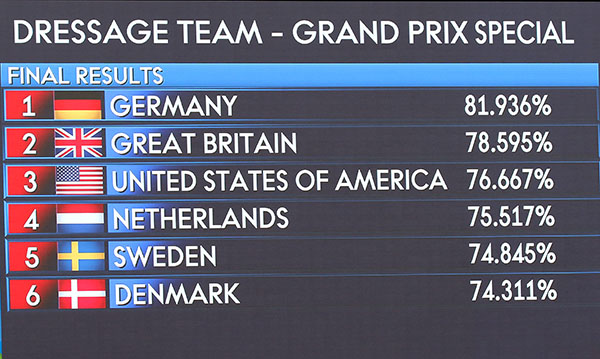Robert Dover–Six-Time Olympian, USA Dressage Coach, Cheerleader-in-Chief, Phenomenal Fundraiser
9 years ago StraightArrow Comments Off on Robert Dover–Six-Time Olympian, USA Dressage Coach, Cheerleader-in-Chief, Phenomenal Fundraiser
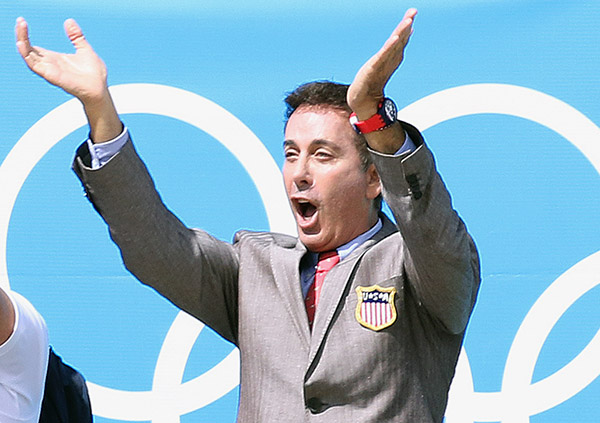
Aug. 14, 2016
By KENNETH J. BRADDICK
The Olympic bronze medal won by the United States dressage team was the culmination of a program driven by Robert Dover to return America to the medals podium and develop a so-called “pipeline” to keep the country among the top nations for years to come.
At the helm of the elite program for three years after a career in which he won four team bronze medals in six Olympics, the 60-year-old Robert has delivered on his promise to American dressage.
Although his official U.S. Equestrian Federation titles are Technical Advisor and Chef d’Equipe, he has been cheerleader-in-chief, seemingly always there, fighting for his team and staying on top of the minutiae in a way that riders from several other nations envy.
Phenomenally successful fundraiser to the tune of an estimated $2.4 million that has sent more American combinations to compete in Europe at Young Rider, Young Horse, Under-25 and both Big and Small Tour levels in the past two years, more than ever before. The role is vital in a nation where there’s no taxpayer or lottery money available–reportedly one of only two countries in the world where this is so.
A coach that pursues perfection that can sometimes exasperate riders and other trainers but Steffen Peters proudly acknowledges his help in the past year. Debbie McDonald as the coach of both Laura Graves on Verdades and Kasey Perry-Glass on Dublet–“It’s almost like our brains are attached,” he says of Debbie–and Michael Barisone as the coach of Allison Brock on Rosevelt. They have been essential not just in the training but in working with Robert to build a team with a spirit that is rare in any nation, even more vital for one that has lived, trained and competed together away from home for three months leading up to these Olympics.
Along the way, Robert, Debbie and Michael have built relationships with owners and supporters who have become vital to the program–Akiko Yamazaki and Jerry Yang who own the horses Steffen rides, Claudine and Fritz Kundrun who own Rosevelt, Kasey’s family, Elizabeth Juliano who supports riders as well as being an owner, horse shipping operator Tim Dutta, and others such as Kim Boyer who owns the Spanish team horse Grandioso retiring after these Games but heads up the U.S. owners group and has made a big investment in American youth programs. And he credits a “super staff” at the federation.
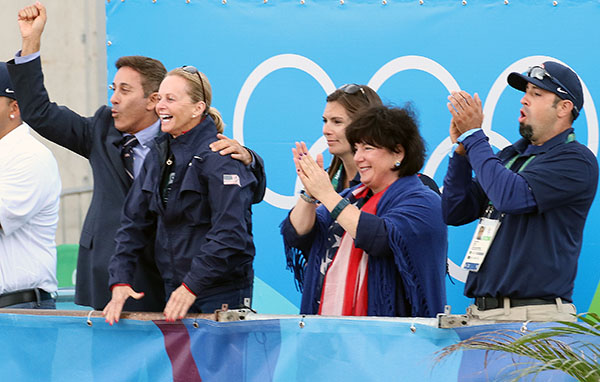
That he has been successful after being spurned for the job he sought after “retirements” from the sport that became legendary for their number is testament to what he believes is a drive to win that is “in the fabric of Americans.”
Factors that draw attention to his position now is that his contract is up after the Olympics.
His leadership came after the United States did not finish with a team at the 2008 Olympics when one combination was disqualified and in London where America sustained its worst performance in more than five decades when the teams in all three Olympic disciplines–dressage, eventing and jumping–failed to medal for the first time in a half century. In the seven years before then, team coach Klaus Balkenhol, the German Olympic gold medalist, was hugely successful with American teams earning medals everywhere they competed, at Olympics, World Games and Pan Americans.
Robert first applied for the job after 2008 but lost out and took a similar job with Canada.
After the 2012 results in London, Robert got his chance.
Now, after success, whether Robert whose base is in Wellington, Florida wants to re-up for another four years he isn’t saying except that he expects to always play some role in American dressage.
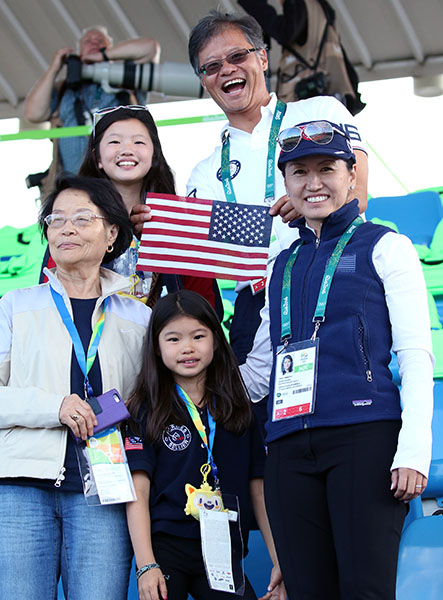
The U.S. has almost as much success in the history of modern dressage as any of the European powerhouses, except Germany, more so even than the Netherlands that has not won as many team medals, and certainly more so than Great Britain that despite a long and influential history in other horse sports did not win a single dressage medal in a century of Olympic horse sports until the 2012 Games in London.
U.S. Army Colonel Hiram Tuttle riding the aptly named Olympic earned individual bronze at the 1932 Games, the only American to ever win an individual Olympic medal. The U.S. won team silver in 1948, again at a time when the military was still dominant in the sport. The next medal did not come until 1976 when America took bronze.
In 1992, the U.S. began a run of winning bronze medals in four straight Olympics. Robert Dover was on all those teams. Among his team mates was Debbie McDonald on Brentina in 2004 and Steffen Peters on his first team in 1996.
“I’m not surprised at where we are,” Robert told dressage-news.com. “I’ve had the story line in my head the same story line I had for decades in which I rode.” He laughs when he adds, “No one will ever say I’m lacking in optimism or, in my own way, pushing my agenda forward.
“One of the things I said jokingly, but it wasn’t a joke, is that I see the podium and if I have to drag the entire nation kicking and screaming in that direction it’s going along for the ride because this is my movie.
“I was really arrogant but if I did nothing I wouldn’t be of service to anyone. So I realize always that there is a reality beyond what is going on in my head. But every single day the work with the riders and horses and their personal trainers has been to produce excellent results.

“The confidence that we had when we went to Athens as a group. That’s something I will never forget. When we went to Barcelona we had no idea we would get a medal. Not at all. When we went to Atlanta four years later we knew we could be good but we had no idea we were going to have the medal there. When we went to Sydney we were pretty much in the habit of having a medal. But by the time we went to Athens we were going to win. The truth is if Athens had the same system of compiling the scores of the Grand Prix and the Grand Prix Special together and then taking the top three scores of each… we would have been gold there. That show we knew we were going to medal, we just didn’t know what color.”
When he took the job it was clear in his mind what his role was to be–while some USEF committee members that made the choice had doubts, others believed his time had come and wanted him precisely for what he promised to deliver.
That was a 58-page document that he called “Road Map to the Podiums,” that set out a plan to develop dressage in the U.S.
Coincidental was the beginning of the Global Dressage Festival in Wellington, in which Robert was instrumental in its creation by pushing his ideas on the Wellington Equestrian Partners that organized the world famous Winter Equestrian Festival of jumpers and hunters. The organizers built Global as a part of WEF but separate so it could flourish. It did, beyond their wildest dreams.
Along with America’s first world class venue dedicated solely to dressage with seven CDIs from a Nations Cup to multiple World Cup events and CDI5* with total prize money of close to three quarters of a million dollars over 12 weeks a community unlike any in the world was born. So many riders competing, bringing with them the top trainers in the world and a focus on dressage that the Americas had never before witnessed. Friday night Freestyles under lights where hundreds of owners, riders and spectators shared bottles of wine along with opinions. An inclusive club of many hundreds was born–dispelling the image of small and exclusive.
Raising money was key to Robert’s program to send as many combinations as possible to compete in Europe as well as programs at home to create “sustainable excellence.”
“Piece by piece we’ve been putting together this puzzle, if you will,” he said. “You’ve seen some changes… some in personnel, adding some programs, a major part having enough money to put the programs in place and make them viable. If you go back through that 58-page document you’d see that we’re not there yet in fulfilling all of it.
“If we were there completely, you would see excellence and sustainable excellence from the tiniest children through that entire pipeline that would look as strong as the top of pyramid is looking at this moment.
“But if we stick to the goal of fulfilling the road map to the podiums we will have the strongest nation, in my opinion, in the world, with the strongest programs of any country.
“What we’re seeing at the the top of our pyramid is the fruition of what we set out to do for that part of the program that I’m directly responsible for. I’m responsible for the whole thing but the part that I can effect most is that part of the high performance international elite division.”
The elite level, Robert believes, will be further enhanced in the next two years by riders and horses as good as the current crop.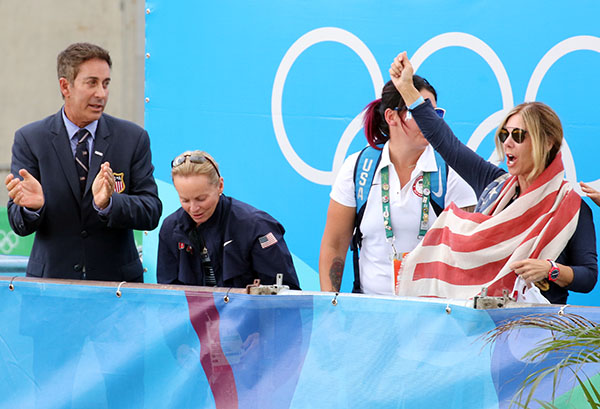
Fund raising has been eye-popping for its success, driven almost single handedly by Robert, organizing weekly American equestrian talent competition–not always super talented singers, dancers and comics perform but usually take the laughter and jeers in good spirits–during Global. They draw huge crowds for dinner and drinks with a cut going to the team and a finale that’s like a Hollywood production at the Global show grounds.
There’s never been anything like it anywhere in the world–even though American jumpers have a big advantage when individuals bid a quarter of a million dollars for Bruce Springsteen to sing one song at one of their fund raisers (his daughter, Jessica, is a top jumper rider) with the money going to the team.
“What’s great about the fund raising is that nothing succeeds like success,” Robert said. “The more success there is the more people want to support the team. It definitely is feeding on itself.”
He has partnered in raising funds with Charlie Weis, the former Notre Dame Fighting Irish football coach as well as the NFL New York Jets, New England Patriots and Kansas City Chiefs who created the Hannah & Friends Foundation, dedicated to his autistic daughter, that has raised millions of dollars for programs for children affected by developmental disorders.
The efforts have not had the same success below top sport.
Pony competitions remain sparse, as many years of efforts to develop that division in America have been almost uniformly unsuccessful. Newly created lead line events, though, have become fun features at Global, where they are part of the Friday night Freestyle program to give them exposure.
Young horse qualifications are, in the view of many, bedeviled by national level judging that is widely described as erratic, poor to atrocious and a program that fails to reach out as it did a few years ago, including to U.S.-based foreign riders of American-owned horses that could qualify for the U.S. for the world championships.
The most successful youth rider programs have been developed by Lendon Gray, a former Olympian and creator of Dressage4Kids, who is backed by Kim Boyer and other owners in staging events in Wellington, New York and the Midwest with plans to expand to California.
